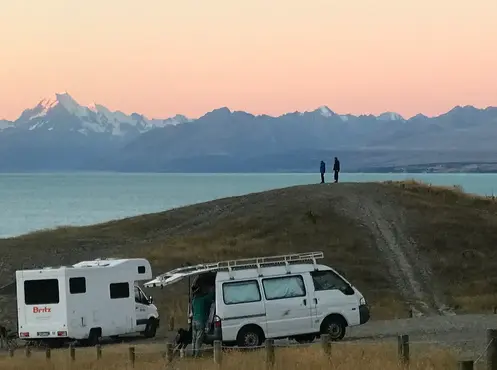Click on image for full view and caption
The freedom camping law needs to change
Miriam Richardson
Return to the use of the NZ standard on self-containment for now.
Initiate a revision process to bring it up to modern requirements, with all the checks and balances required for the proper making of standards. If freedom camping requires more than the general standards, make it an extra certification for just those things that are different.
There are so many technical errors in the current regulations, trying to fix them all is virtually impossible on a clause by clause revision.
Remove the need for two parallel systems of self-containment assessment. The new system only applies to freedom camping, and is needlessly restrictive, so a parallel system has to be maintained to cater for other places and uses.
Remove the requirement for fixed toilets.
It is the using of toilets that protects the environment, not their ‘fixedness’.
Tent campers, campers with small vehicles, poptops, roof top and other kinds of campers often carry a portable toilet and a toilet tent when camping in places that do not provide toilets: this works; and works perfectly.
Remove the offence “preparing to freedom camp” because it is impossible to ascertain what someone is intending to do later in the day.
“Day-trip excursions,” which are explicitly allowed in the law, are identical in appearance to “preparing to freedom camp.”
Parking in order to shop is also explicitly allowed, but it is identical in appearance to preparing to freedom camp, since “parking with the intention…” is the legal measure of an offence, and intentions are not visible, but parking is.
Differentiate between NZ citizens and tourists.
Citizens should have rights to access their own country, whether tourists do or not.
Ensure tourists who exit NZ pay any fines they incurred while here.
Require education about self-containment and appropriate behaviour to be delivered by businesses that provide campervans to travellers.
Make the delivery of offence notices fair.
Currently, the mere fact a council employee presses the send button in their email programme is sufficient to make a notice ‘served’. Electronic delivery has many obvious problems.
You can’t respond to an alleged offence if you don’t receive the notice. The current law is not fair.
Remove the revision to the definition of homelessness.
This seems to have been intended to stop people who live in their vehicles being treated as ‘homeless’ when parked in freedom camping areas.
NZ is short so many thousands of houses, anyone who can manage in a vehicle deserves to avoid legal arguments about whether they are homeless or not.
The homeless person is forced into a legal battle with the council to add to their other woes.
People can be or become homeless while living in a motorhome or bus. Physical and health challenges can reduce their capacity to manage the physical work required. As they search for accommodation or sit on waiting lists for housing, they are homeless, even though they still live in their tent, car, van, bus or motorhome.
The law is vague: are you ‘unable’ to stay in this campground/motel/boarding house/hotel? What does ‘unable’ mean? • A motel or camping ground is too far away? What is ‘too far’? • Not enough money to pay? Is having 1 night’s worth of dollars for a campground enough?• … what about on night 2? • What if the campground is not open when they arrive in a town so they are ‘unable’ to stay there?
Ensure there are adequate facilities for travellers
Many councils spent money on enforcement that could have been spent providing facilities so no enforcement was necessary. Turn this around. Ensure there are enough public toilets in enough places to meet the needs of all the travelling public.
It’s people in cars (who don’t carry a toilet) who are getting caught short, not those with portable and accessible toilets on board.
More on Freedom camping and self-containment:

6 Summer 2023
, p
2

